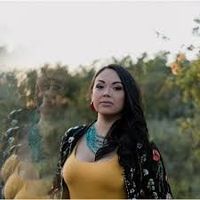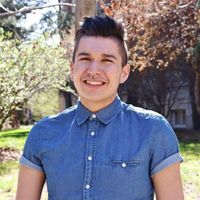A Changing Landscape: FOLD Authors Talk Diversity, The Writing Life, and Favourite Reads
The Festival of Literary Diversity (popularly known as FOLD) has been bringing together creators from diverse and underrepresented communities world-wide since its inception in 2016. Held during the first week of May, the four-day gathering's 30-plus events include panel discussions, writing workshops, and networking events where both new and established storytellers can flourish and connect.
Due to ongoing COVID-19 concerns, this year's festival will be 100% virtual, featuring a plethora of closed-captioned free online events to be held via Zoom. It runs April 30-May 3. Those interested can visit the festival's website for more information.
We talked to three participating authors about how they got involved with the festival, what an average writing day looks like, and their own experiences with diversity in CanLit.
Billy-Ray Belcourt, author of NDN Coping Mechanisms (House of Anansi), Sonya Lalli, author of Grown-Up Pose (PRH), and Helen Knott, author of In My Own Moccasins: A Memoir of Resilience (University of Regina Press) talk to us about struggling to write in the face of global crisis, the problem of cultural appropriation, and what it felt like to finally see yourself represented in a book.
Open Book:
Tell us about how you become involved with the FOLD and what you'll be doing in the festival.
Helen Knott:
I became involved with FOLD by invitation and was immediately drawn to the festival once I looked at how the previous years played out. As a northern writer I tend to be quite isolated from other creatives and a strong literary community, so this was a great opportunity not only for myself as an author, but to grow as a writer.
I will be speaking on a panel on Reconciliation & Resistance on Friday, May 1st followed by the facilitation of a nonfiction workshop the following day.
Sonya Lalli:
I was already a huge fan of FOLD and Jael Richardson, and I was so excited when they reached out! This year I’ll be taking part in two events. The first is the FOLD Lite panel where we’ll be discussing the real-life people, circumstances, and events that shaped and inspired our latest works. Like the main character in my latest book, Grown-Up Pose, I have a South Asian upbringing and I made the tough decision to leave a traditional career path to chase my passion. There are a lot of parts in Grown-Up Pose that were borrowed from my real life (and my friend’s lives).
The second event is the ‘Better Bring the Book Club’ panel. I’m excited about this event because ‘book club fiction’ is actually my favourite genre – I love books that get me thinking and provoke thoughtful discussion, so this is going to be a great conversation.
Your CanLit News
Subscribe to Open Book’s newsletter to get local book events, literary content, writing tips, and more in your inbox
Open Book:
Can you share a little about your experience of diversity (or barriers to diversity) in Canadian literature, both as a writer and reader?
Billy-Ray Belcourt:
Canadian literature is an institution; it is made up of bodies and norms, and through it capital of all kinds flows. What this means is that some more than others (or some and not others) can represent it, perform it. It is sociologically unsurprising that only recently queer and/or Indigenous writers have gained (contingent) access to something of an institutional life in this country (though this does not mean the vectors of power that once excluded us have suddenly disappeared). “Diversity” is a clunky name for a wide range of activities that trouble business-as-usual. “Diversity” has use-value. It can get some to the table - though more of us want to abolish the table all together. I’m not convinced it’ll save us, as I don’t believe we as minoritized writers need saving in the first place. What I think is important about a festival like FOLD is that it carves out space for us to care for one another, to conspire, to subvert. It is that spirit I am drawn to.
We can do literature differently - an un-Canadian literature. We can ignore the barrier altogether and turn back toward ourselves and our communities.
HK:
I feel like we are living in a time with so many beautiful emerging and divergent voices being published. Ever since I was a little girl, I loved getting lost in other worlds through reading and it seems as though I am able to do so more and more now. I believe the challenge is holding on to the “right” to our own voices as writers from minority groups that have experienced intersecting and interlocking oppressions. Now that the literary landscape has expanded and welcomed these voices, there are people from outside of these experiences wanting to step into these stories and tell them. It reminds me of a quote I heard somewhere that goes something like, “Everyone wants to be an Indian until it’s time to be an Indian”. Which essentially means, you don’t get to hold onto the good parts of a culture and turn away from the historical oppression, colonial legacy, and the necessary current work of dismantling said legacy.
SL:
To be completely honest, I didn’t really notice a lack of diversity in Canadian literature until recently. Growing up, I was just used to not seeing myself represented in books, or if there was someone “like me”, they were in the margins or as exceptions in literature, film and media.
The Namesake by Jhumpa Lahiri is one of my all-time favourite books. While the story and writing are brilliant, looking back I realize it may have become my favourite because it was the first time I saw myself and my experiences as the child of South Asian immigrants represented in a book. I could relate to it and it made me feel included.
As a writer, I write what I know, and writing South Asian characters means I can draw from my own experiences to give my stories a real authenticity. However, I still feel that more can be done to increase the representation of girls and women of colour in books. Thankfully, things are now really starting to change in publishing. In recent years there has been much more representation.
I write romantic comedies and I’m so pleased that I’m not the ‘token’ desi romance writer out there, because I could never expect that my own experiences and writing would represent all of us. I’m from a very particular community, raised a particular way, and my experiences are not one of all brown girls, but of a section of us. I’m extremely happy that my books are part of a great selection of stories out there that can represent a wide range of experiences, including Ayesha at Last by Uzma Jalaluddin and The Chai Factor by Farah Heron.
OB:
What does an average writing day look like for you? What, if any, are the tools or rituals you find yourself most in need of when settling down to work on a writing project?
BRB:
These days writing looks mostly like everything but sitting down to put sentences together! I have been reading poems when I can. I recently tweeted these lines from Etel Adnan’s Time: “Words are sitting among / us but look at other / landscapes. Where are we?” Perhaps I have been trying to confront other landscapes, or the state of the world has prevented me from doing anything else, bringing them more sharply into focus. What is a writing life in the face of so much uncertainty? What I know is that I still have a duty to love, art, and freedom.
HK:
Recently I have been writing about the recent loss of my mama. I am gentle with myself when I am writing about life events that require real-time processing. I don’t have a schedule when it comes to this type of writing. If I open up my laptop to write and am crying five minutes later, I close my laptop without judgement. Sometimes writing is a secondary process for me and the real work is the healing that takes place.
In isolation, I have been writing at odd hours of the night, sometimes beginning around 10:00 pm and not stopping until 1-2:00 am. Usually I prefer to work in the mornings as I find my mind is the sharpest and has a post-sleep clarity I don’t get if I try to write mid-day. I only sit and write for one to two hours in the mornings, as anything beyond that feels like I am on a fishing expedition in a puddle.
SL:
Since I have a full-time job, I don’t get to write as often as I like. Sometimes I try to write after I get home from my day job, but usually I don’t have enough energy to really get into it. Most often, I write on the weekends – Saturday or Sunday, or sometimes both if I don’t have other plans.
When I’m settling down to work, I need to have a cup of tea or coffee, lots of room on my kitchen table, and a long stretch of time where I know I won’t be interrupted.
I also like having the apartment to myself when I’m writing. This is because I often talk out loud to myself as I write – I act out my characters talking to each other. I find it’s much easier to get the dialogue right – the rhythm and authenticity – if I can hear the conversation going back and forth.
OB:
Tell us about a book you've loved and would like to highlight that you feel is an example of the diverse literature the FOLD is celebrating.
BRB:
Brandon Taylor’s Real Life was a delight. It paints a portrait of an individual’s life at the nexus of race, gender, sexuality, class, and place, and does so with empathy and humanity, without planting a false joy where anger and sadness are more illuminating and politically powerful.
HK:
One of my favourite poetry books is The January Children, written by Safia Elhillo who is a Sudanese-American poet. I purchased it after watching some of her piercing spoken word performances. Her writing pulls me into the recesses of my being and makes me sit with unspoken truths. Every now and again you collide with a voice like hers, one that makes you want to either fall impossibly in love and let it break you open or shun it altogether and build a shrine to yourself.
SL:
One book I really loved was My Sister, the Serial Killer by Oyinkan Braithwait, which came out last year. This book has it all - a complex protagonist, a vibrant setting, a thrill-filled, intriguing pace, and a problematic love triangle. The writer is Nigerian and incredibly talented, and I’m so happy to see how well the book is doing all over the world.
__________________________________________________________________________
Billy-Ray Belcourt is a writer and academic from the Driftpile Cree Nation. He is an Assistant Professor in the Creative Writing Program at the University of British Columbia. He is also a Ph.D. candidate and 2018 Pierre Elliott Trudeau Foundation Scholar in the Department of English & Film Studies at the University of Alberta. He is also a 2016 Rhodes Scholar and holds an M.St. in Women's Studies from the University of Oxford and Wadham College. In the First Nations Youth category, Belcourt was awarded a 2019 Indspire Award, which is the highest honor the Indigenous community bestows on its own leaders.
In 2018, Billy-Ray was named by CBC Books as one of “14 Canadian poets to watch,” one of “18 emerging writers to watch,” and a “Writer to know.” That year, he was also named one of “ten young Canadians to watch” by the CBC.
Billy-Ray’s debut book of poems, This Wound is a World (Frontenac House 2017), won the 2018 Griffin Poetry Prize (making him the youngest ever winner) and the 2018 Robert Kroetsch City of Edmonton Book Prize. It was also named the Most Significant Book of Poetry in English by an Emerging Indigenous Writer at the 2018 Indigenous Voices Awards. This Wound is a World was a finalist for the 2018 Governor General’s Literary Award for Poetry, the 2018 Robert Kroetsch Award for Poetry, the 2018 Gerald Lampert Memorial Award, and the 2018 Raymond Souster Award, both of the latter via the Canadian League of Poets. It was also named by CBC Books as the best “Canadian poetry” collection of 2017. U.S. (University of Minnesota Press) and French (Groupe Nota Bene) editions of the book are now available.
His sophomore book, NDN Coping Mechanisms: Notes from the Field, a national bestseller, is out now. According to Open Book, the book “cements [Belcourt] as one of the most imaginative and creative writers in the country.” Of the poems, the Toronto Star says “both intellectual and visceral, [they] dazzle with metaphoric richness and striking lyricism.” It has been longlisted for Canada Reads 2020 and shortlisted for the 2020 Lambda Literary Award for Gay Poetry, the 2020 Robert Kroetsch City of Edmonton Book Prize, the 2020 Stephan G. Stephansson Award for Poetry, and the 2020 Raymond Souster Award.
His third book, A History of my Brief Body, essays and vignettes on grief, colonial violence, joy, love, and queerness, is due out in Canada in August 2020 with Hamish Hamilton, an imprint of Penguin Canada, and in the US in July 2020 with Two Dollar Radio. In a starred review, Kirkus Reviews called it “elegantly crafted” and “an urgently needed, unyielding book of theoretical and intimate strength.”
His creative writing is represented by Stephanie Sinclair at Transantlantic Agency.
Helen Knott is a Dane Zaa, Nehiyaw, and mixed Euro-descent woman living in Fort St. John, British Columbia. In 2016 Helen was one of sixteen global change makers featured by the Nobel Women's Initiative for being committed to end gender-based violence. Helen was selected as a 2019 RBC Taylor Prize Emerging Author. In My Own Moccasins is her first book.
Sonya Lalli is a Canadian writer of Indian heritage. She studied law in her hometown of Saskatoon and at Columbia University in New York, and later completed an MA in creative writing and publishing at City, University of London. Sonya has a black belt in tae kwon do and loves travel, yoga, and cocktail bartending. She lives in Toronto with her husband.





